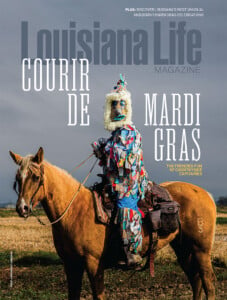Nick Spitzer
Louisianian of the Year: Culture

Portrait by Romero & Romero
When local folklorist and Tulane professor Nick Spitzer’s caller ID told him Senator Bill Cassidy’s office was calling, he assumed it was a fundraising call and decided he wasn’t going to answer. But his wife urged him to answer it. Spitzer did, and found himself speaking to Senator Cassidy himself, who was calling to congratulate Spitzer on winning the National Endowment for the Arts’ Bess Lomax Hawes National Heritage Fellowship.
“I was silent for about three hours,” said Spitzer, who routinely talks for hours as part of his work hosting his WWNO radio program “American Routes.”
The 73-year-old Spitzer has long had a love of radio. He grew up in Connecticut and listened to music, New York Yankees baseball games and Montreal Canadiens hockey games on the radio.
“Radio was magical to me,” Spitzer said. “A voice being thrown over a long distance.”
When at graduate school at the University of Texas at Austin, he made his first forays into Southwest Louisiana. After visiting a fais do-do hosted by the accordion player Bois Sec Ardoin, he fell in love with zydeco music and Louisiana culture. He ended up even moving into Ardoin’s house for a time. He made two LPs from field recording Louisiana musicians at night clubs. Zydeco’s unique sound captivated him.
“Zydeco is neither fully African, French nor African-American,” Spitzer said.
In 1998, Spitzer started “American Routes.” He estimates that he has done over 1200 interviews during his time on the show. While he interviews many Louisiana musicians, he does not limit it to locals. He counts Santana and Dolly Parton as among his favorite interview subjects.
“Dolly was very bright, very funny,” Spitzer said.
Others proved more challenging. Joan Baez seemed reluctant to open up at first, but Spitzer was proud that she eventually did over the course of the interview. And every now and then, one backfires like when Ike Turner bailed out after three minutes due to the mention of his ex-wife Tina Turner.
Spitzer feels it is easier for a potentially shy or guarded subject to open up during a radio interview. He said it is because a radio interview involves less people and equipment. A TV interview involves a lot of equipment, lighting and crew members. It can be intimidating for subjects. But often a radio interview is just two people sitting together with a microphone. It feels more like a conversation.
While Spitzer has had great success in his career, he is all too aware that much of it came perilously close to not happening after he was stricken with lung cancer in 1979. The diagnosis was so bleak, Spitzer spent weeks in hospice care. He went from 165 pounds to 100 pounds.
“I was prepared to die,” Spitzer said.
But after grueling chemotherapy and surgery, Spitzer made a miraculous recovery. The experience gave him renewed confidence and a sense of purpose.
“I was just happy to be alive. It made me realize everyone’s time is limited,” Spitzer said. “I will never fear death again.”
